Coventry City of Culture: The women who helped shape a 'city of justice'
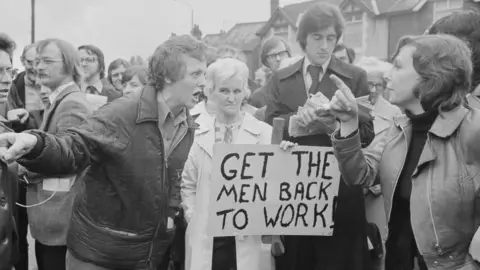 Getty Images
Getty ImagesFrom Lady Godiva's battle for fairer taxes to the fight for better housing, pay and conditions, Coventry's history is packed with women who have spoken up on behalf of the oppressed or voiceless.
Acts of rebellion and resistance in the city have included the fight for the vote, the tragic death of an animal rights campaigner and schoolgirls protesting for the right to wear trousers.
According to legend, Godiva, who was married to Leofric, the Earl of Mercia and Lord of Coventry, rode naked through the city's marketplace in order to reduce taxes imposed by her husband.
"I would be the kind of person that would ride on a horse naked if it meant people in Palestine or Syria could be free, or women can walk the streets safely or the LGBTQ community wouldn't get the abuse that they do," said Reena Jaisiah.
The associate teacher was chosen as one of 14 women from the city to act as modern-day Godivas as part of Coventry's City of Culture festival opening event for her work championing the spirit of activism and social justice.
"I think I'm a voice for the voiceless," said the 41-year-old, who has helped raise issues such as casteism, period poverty and the sexual exploitation of women.
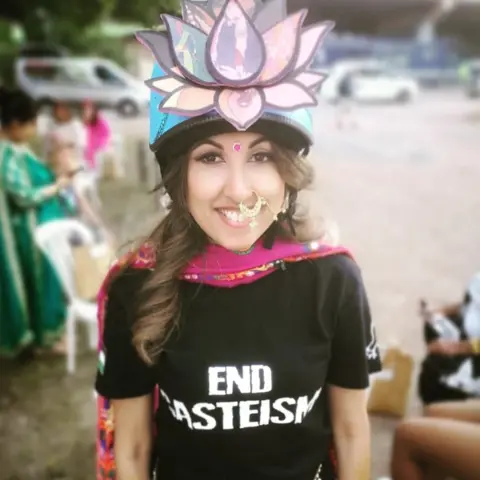 Marianne Taviner Vortex Creates
Marianne Taviner Vortex Creates"The indignation I faced growing up gave rise to this voice inside of me," she said.
Running a theatre group in Coventry, she has also written a play about experiences of caste prejudice.
"I like to do protest in a creative way, I don't want to shout and scream - I use art and theatre for my voice, and most importantly, other people's voices."
The city has a rich history of women fighting for social change, according to historian and author Dr Cathy Hunt. But sometimes their stories are skipped over because they "just got on with it".
"As a working city there has always been a need to focus on people in work, conditions and pay and women have always had the strength and resolve to be at the heart of that struggle," Dr Hunt said.
"In a city renowned for innovation, change and welcoming newcomers, it's important and timely that there is recognition of women's contributions, past and present, to making sure that justice and fairness extend to all."
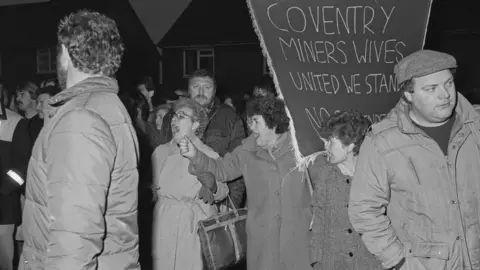 Getty Images
Getty ImagesThe City of Culture opening event, Coventry Moves, culminated in the 14 Godivas handing over their demands to the city's first female leader of the council.
Ann Lucas was watched by female councillors and the city's three women MPs which was in itself significant, said Dr Hunt.
The theme of social justice also spurred craft group organiser Niki Doughty-Lee, 60, to get involved in the event by helping sew the banners that accompanied the Godivas on their city journey.
The retired probation officer said standing up for the underdog had always been an important driver for her.
"The visual impact [of the banners] was greater than a load of people standing protesting in Trafalgar Square," she said. "Some people don't have very positive images of activists out there shouting, so doing it this way I think is multi-faceted."
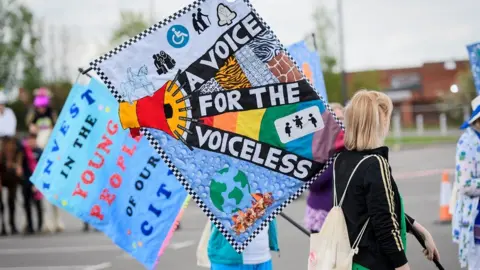 FiveSixPhotography
FiveSixPhotographyCoventry's history is chequered with examples of women standing up for what they believe in.
In October 1938 a special train was chartered to take more than 100 people from Coventry to London in a protest organised by the city's first woman mayor Alice Arnold.
She led a procession from Euston station to the Home Office to hand in a petition signed by 60,000 of the city's citizens.
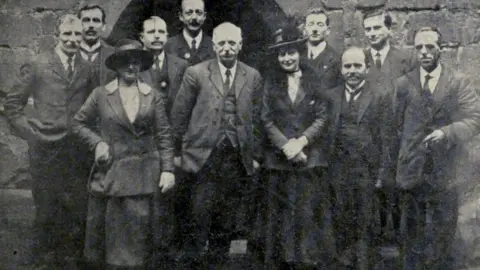 Culture Coventry Trust/Coventry Archives
Culture Coventry Trust/Coventry ArchivesThrough door knocking and public meetings, the councillor had been able to gather the signatures from nearly a third of the city's population in favour of her so-called "Peace and Plenty" petition, which called for a more just and peaceful society.
The cavalcade, complete with band, stretched a quarter of a mile long and was cheered on its way to Whitehall.
Miss Arnold, born into a workhouse in 1881 and working by the age of 11, was a hugely significant figure in Coventry's history of women's protest, said Dr Hunt, author of A History of Women's Lives in Coventry.
"She grew up working in the factories and developed a strong sense of wanting to help people and serve her community, getting involved in socialism and trades unionism.
"When she became one of the first two women councillors, along with Ellen Hughes, in 1919, she didn't forget the factory workers and stood up for issues that often got overlooked and neglected like maternity rights, child welfare and decent housing.
"Coventry was everything to her," she added. "She would have loved the City of Culture and the world's eyes on the city and no doubt she would have ensured that issues of social justice were given full attention."
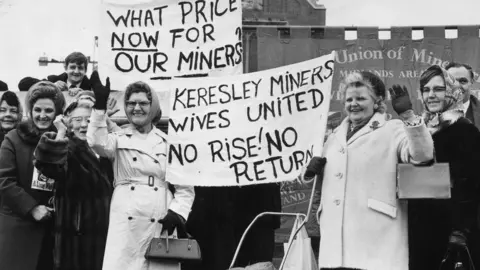 Getty Images
Getty ImagesPresident of Coventry Trades Union Council Jane Nellist puts the city's strong tradition of women activists down to its early history with the socialist movement.
The trades unions were incredibly strong in the city, she explained, with some in engineering negotiating the "Coventry rate" of pay, which was higher than most other places in the country, and the men backing the women's campaigns.
"Looking back through Coventry's history there have been huge protests of women who demanded equal pay in the factories, and some of them even got it," she said.
But much of the history, including that of a "formidable" collection of striking miners' wives, often got overlooked, she said.
The women set up a group in 1984 to protest against the pit closure in Keresley village and travelled the country raising funds and boosting morale, as well as helping to feed families affected by the national strike action. Twelve years earlier women had also joined protests during the 1972 UK miners' strike.
"What was astounding about those women was the power and respect that they had and the role that they played," said Mrs Nellist.
She describes how Coventry women were also at the heart of a campaign against the poll tax "which is quite apt when you link that to Lady Godiva".
The union leader herself went to court for non-payment of the controversial Community Charge along with her husband Dave, then a Coventry Labour MP but who in 1991 was expelled by his party and its leader Neil Kinnock for his links to the left wing Militant group.
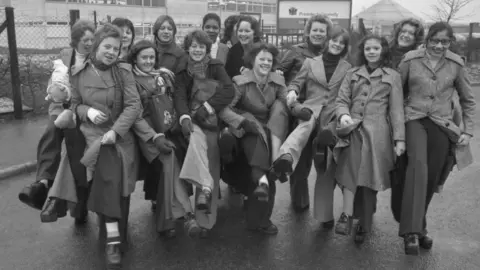 Getty Images
Getty Images"A lot of them had never been involved in anything political before, but they were there because of the way it affected them. Whether you were working or not you were expected to pay," Mrs Nellist recalled.
"Men might have been in some of the leading positions but at the heart of it were women. Some were working, some were not working, some had young children.
"They were very involved in attending meetings and rallies with many also refusing to pay."
A flagship policy of Margaret Thatcher's government, the Community Charge, more commonly called the poll tax, was eventually replaced after triggering mass civil disobedience and riots and some were sent to prison for non-payment.
"Coventry was quite important in the development of the anti poll tax campaign - and of course we won," Mrs Nellist added.
On 14 February 1995 hundreds of people including actress Brigitte Bardot gathered at Coventry Cathedral to attend the funeral of animal rights protester Jill Phipps.
The young mother had been killed during a protest at the city's airport in Baginton against the live export of veal calves.
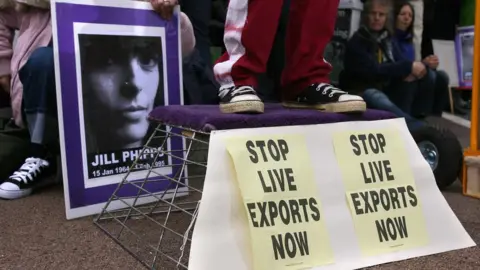 Getty Images
Getty ImagesAccording to fellow protesters she had run towards a lorry laden with the animals as it approached the gates of the airport, escorted by police. A policeman yelled for the driver to stop. Ms Phipps was trapped beneath its wheels and died.
More than 25 years later, the government is looking to ban live exports of animals under a new bill.
From the suffrage struggle to the miners' wives, history often depicts women protesters as bold and loud, but they were also brave, said Dr Hunt.
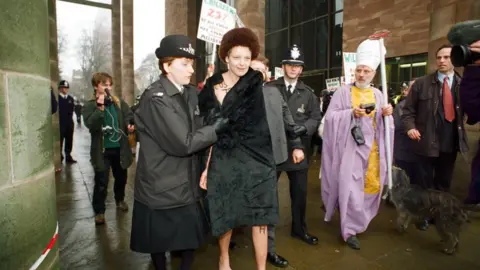 Getty Images
Getty Images"They were often women not used to public speaking, but for their cause they stood on public platforms making themselves talk to crowds.
"In the case of the suffrage speakers, they often faced hostile crowds who threw things and on occasion even chased them through the streets.
"We should never take for granted what women activists have put themselves through, trying to make a difference to people's lives."

Follow BBC West Midlands on Facebook, Twitter and Instagram. Send your story ideas to: [email protected]
